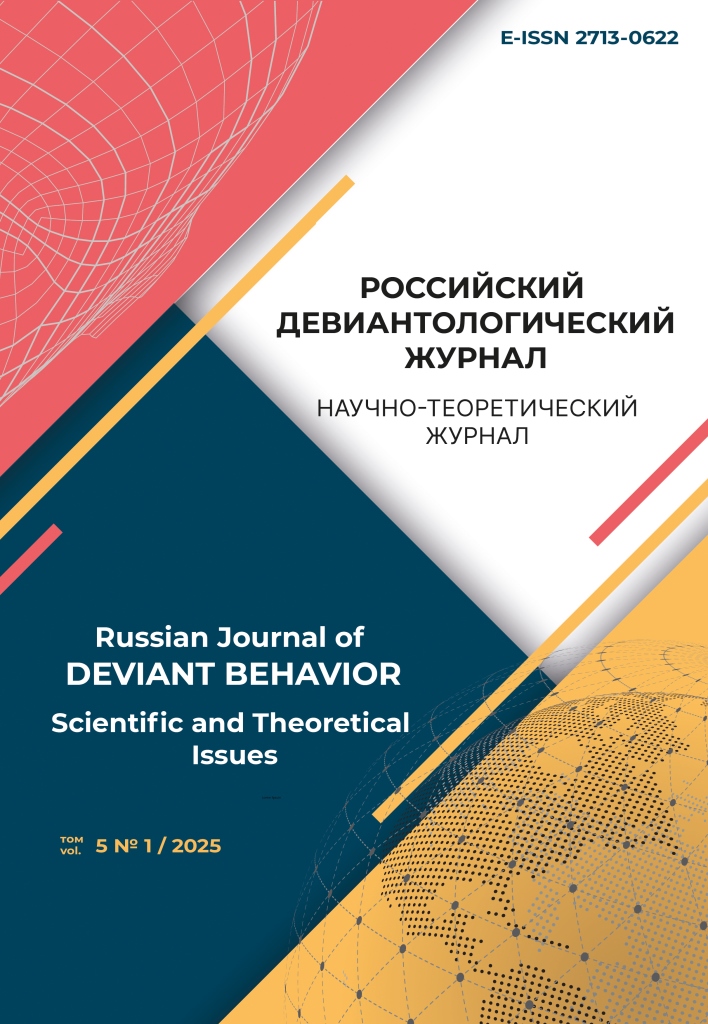employee
Ekaterinburg, Ekaterinburg, Russian Federation
Russian Federation
UDC 159.9
Introduction. The relevance of the research is determined by the presence of mockery in student educational environment. It can be a psychotraumatic factor, lead to reduction of inner resources and sense of security, contribute to anxious states being estimatedby other people. The fear of mockery leads to communication difficulties, social alienation, isolation and personality disharmony. Research methods. In order to establish the correlation between the mentioned phobia and students’ resilience, the methods of diagnosing the level of gelotophobia, assessing the ability to distinguish between situations of friendly joking and aggressive mocking, studying stress traits and coping behaviour strategies were used. The research sample consisted of higher institutions students (N=202) aged 18-26 years. The results of the research reveal that students demonstrate moderate wariness and anxiety in situations involving humour and laughter, the possibility of being estimated by others, as well as adequate distinction between situations of joking and mocking. The authors identified that young men more often enjoy and are surprised by situations of mockery, while girls react with sadness and shame. Average indicators prevail in the resilience scales, reflecting a moderately pronounced ability to cope with difficulties and stress. The obtained data confirm that gelotophobia and resilience are opposite characteristics: the stronger is the fear of being mocked, the lower is a person's resilience and the stronger is the expression of stress symptoms.
gelotophobia, friendly joking, aggressive mockery, resilience, coping techniques
1. Ajzenk, G. (2014). Lichnostnyj oprosnik Ajzenka (EPI). PSYCHOJOURNAL.RU: Psihologicheskij zhurnal. URL: https://psychojournal.ru/tests/118-lichnostnyy-oprosnik-ayzenka-epi.html (data obrashcheniya: 18.09.2023).
2. Aleksandrova, L. A. (2004). K koncepcii zhiznestoĭkosti v psihologii. V Sibirskaya psihologiya segodnya: sbornik nauchnyh trudov (vyp. 2, str. 82–90). Kemerovo: Izd-vo OOO "Avtorskoe izdatel'stvo Kuzbassvuzizdat".
3. Boyazitova, I. V., Erkenova, M. M. (2018). Lichnostnye resursy kak osnova zhiznestojkosti v studencheskom vozraste. Veles, 12-1 (66), 77–84. EDN: https://elibrary.ru/YTHLWP
4. Garanina, M. M. (2023). Fenomen zhiznestojkosti: podhody k rassmotreniyu, perspektivy izucheniya. Mezhdunarodnyj nauchno-issledovatel'skij zhurnal, 12 (138). https://doi.org/10.23670/ IRJ.2023.138.184. EDN: https://elibrary.ru/DXHPCK
5. Drozdova, N. V., Asmankina, E. E. (2023). Osobennosti zhiznestojkosti v yunosheskom vozraste. Problemy sovremennogo pedagogicheskogo obrazovaniya, 78-1, 312–316. EDN: https://elibrary.ru/RRBBJL
6. Evtushenko, E. A. (2016). Zhiznestojkost' lichnosti kak psihologicheskij fenomen. Lichnost', sem'ya i obshchestvo: voprosy pedagogiki i psihologii, 60, 72–78. EDN: https://elibrary.ru/VHNRJR
7. Zyat'kova, E. O., Stoyanova, I. Ya., Yazykov, K. G. (2021). Stressoustojchivost' i zhiznestojkost' kak psihologicheskij resurs pri gelotofobii v kontekste psihologicheskogo zdorov'ya studentov. Sibirskij psihologicheskij zhurnal, 80, 146–164. https://doi.org/10.17223/17267080/80/8. EDN: https://elibrary.ru/LARLUD
8. Ivanova, E. M., Enikolopov, S. N., Stefanenko, E. A. (2016). Osobennosti otnosheniya k yumoru i smekhu v Rossii. Vestnik Rossijskogo gumanitarnogo nauchnogo fonda, 2 (83), 167–181. EDN: https://elibrary.ru/WDHHLT
9. Ivanova, E. M., Makogon, I. K., Stefanenko, E. A. i dr. (2016). Russkoyazychnaya adaptaciya oprosnika gelotofobii, gelotofilii i katagelasticizma PhoPhiKat. Voprosy psihologii, 2, 162–171. EDN: https://elibrary.ru/WIALIZ
10. Ivanova, P. O., Ivanova, E. M. (2019). Aprobaciya russkoyazychnoj versii Oprosnika scenariev druzhelyubnogo podshuchivaniya i agressivnogo vysmeivaniya (OSPV) T. Platt. Klinicheskaya i special'naya psihologiya, 8 (2), 140–158. https://doi.org/10.17759/cpse.2019080208. EDN: https://elibrary.ru/RCCPMZ
11. Ivanchenko, T. A. (2009). Metodika inventarizaciya simptomov stressa. PSYTESTS.ORG: psihologicheskie testy onlajn. URL: https://psytests.org/stress/isyns.html
12. Kucheryavenko, I. A., Grineva, O. I., Egolaeva, E. S. (2023). Fenomen zhiznestojkosti v psihologicheskoj nauke. Problemy sovremennogo pedagogicheskogo obrazovaniya, 79-2, 429–432. EDN: https://elibrary.ru/ALFAMX
13. Lazarus, R., Folkman, S. (2009). Sposoby sovladayushchego povedeniya, WSQ. PSYTESTS.ORG: psihologicheskie testy onlajn. Adaptaciya: NIPNI. URL: https://psytests.org/coping/wcq-run.html
14. Leont'ev, D. A., Osin, E. N. (2007). Pechat' ekzistencializma: empiricheskie korrelyaty ekzistencial'nogo mirovozzreniya. Ekzistencial'naya tradiciya: filosofiya, psihologiya, psihoterapiya, 1 (10), 121–130.
15. Leont'ev, D. A., Rasskazova, E. I. (2006). Test zhiznestojkosti. Moskow: Izdatel'stvo Smysl.
16. Nalivajko, T. V., Shakurova, Z. A. (2010). Osobennosti proyavleniya zhiznestojkosti v strukture social'no-psihologicheskih svojstv lichnosti studentov. Vestnik Yuzhno-Ural'skogo gosudarstvennogo universiteta. Seriya: Psihologiya, 27 (203), 44–49. EDN: https://elibrary.ru/MWJYFR
17. Samohvalova, A. G. (2016). Gelotofobiya kak faktor vozniknoveniya kommunikativnyh trudnostej podrostkov. V V. S. Belgorodskij, O. V. Kashcheev, V. V. Zotov, I. V. Antonenko (red.), Gumanitarnye osnovaniya social'nogo progressa: Rossiya i sovremennost': sbornik statej Mezhdunarodnoj nauchno-prakticheskoj konferencii (Moskva, 25–27 aprelya 2016 goda, str. 132–138). Moskow: Moskovskij gosudarstvennyj universitet dizajna i tekhnologii. EDN: https://elibrary.ru/WKZHCD
18. Stefanenko, E. A., Ivanova, E. M., Enikolopov, S. M. i dr. (2011). Diagnostika straha vyglyadet' smeshnym: russkoyazychnaya adaptaciya oprosnika gelotofobii. Psihologicheskij zhurnal, 32 (2), 94–108. EDN: https://elibrary.ru/NTJYQN
19. Yaroshchuk, I. V. (2020). Psihologiya zhiznestojkosti: obzor teoreticheskih koncepcij, empiricheskih issledovanij i metodik diagnostiki. Uchenye zapiski Sankt-Peterburgskogo gosudarstvennogo instituta psihologii i social'noj raboty, 33 (1), 50–60. EDN: https://elibrary.ru/KSCJEN
20. Bledsoe, T. S., & Baskin, J. J. (2014). Recognizing Student Fear: The Elephant in the Classroom. College Teaching, 62 (1), 32–41. https://doi.org/10.1080/87567555.2013.831022
21. Ruch, W., Beermann, U., & Proyer, R. T. (2009). Investigating the humor of gelotophobes: Does feeling ridiculous equal being humorless? Humor: International Journal of Humor Research, 22 (1-2), 111–144. https://doi.org/10.1515/HUMR.2009.006
22. Ruch, W., Hofmann, J., & Platt, T. (2015). Individual differences in gelotophobia and responses to laughter-eliciting emotions. Personality and Individual Differences, 72, 117–121. https://doi.org/10.1016/j.paid.2014.08.034
23. Ruch, W., & Proyer, R. T. (2008). The fear of being laughed at: Individual and group differences in Gelotophobia. Humor: International Journal of Humor Research, 21 (1), 47–67. https://doi.org/10.1515/ HUMOR.2008.002
24. Titze, M. (2009). Gelotophobia: The fear of being laughed at. Humor: International Journal of Humor Research, 22 (2), 27–48. https://doi.org/10.1515/HUMR.2009.002














